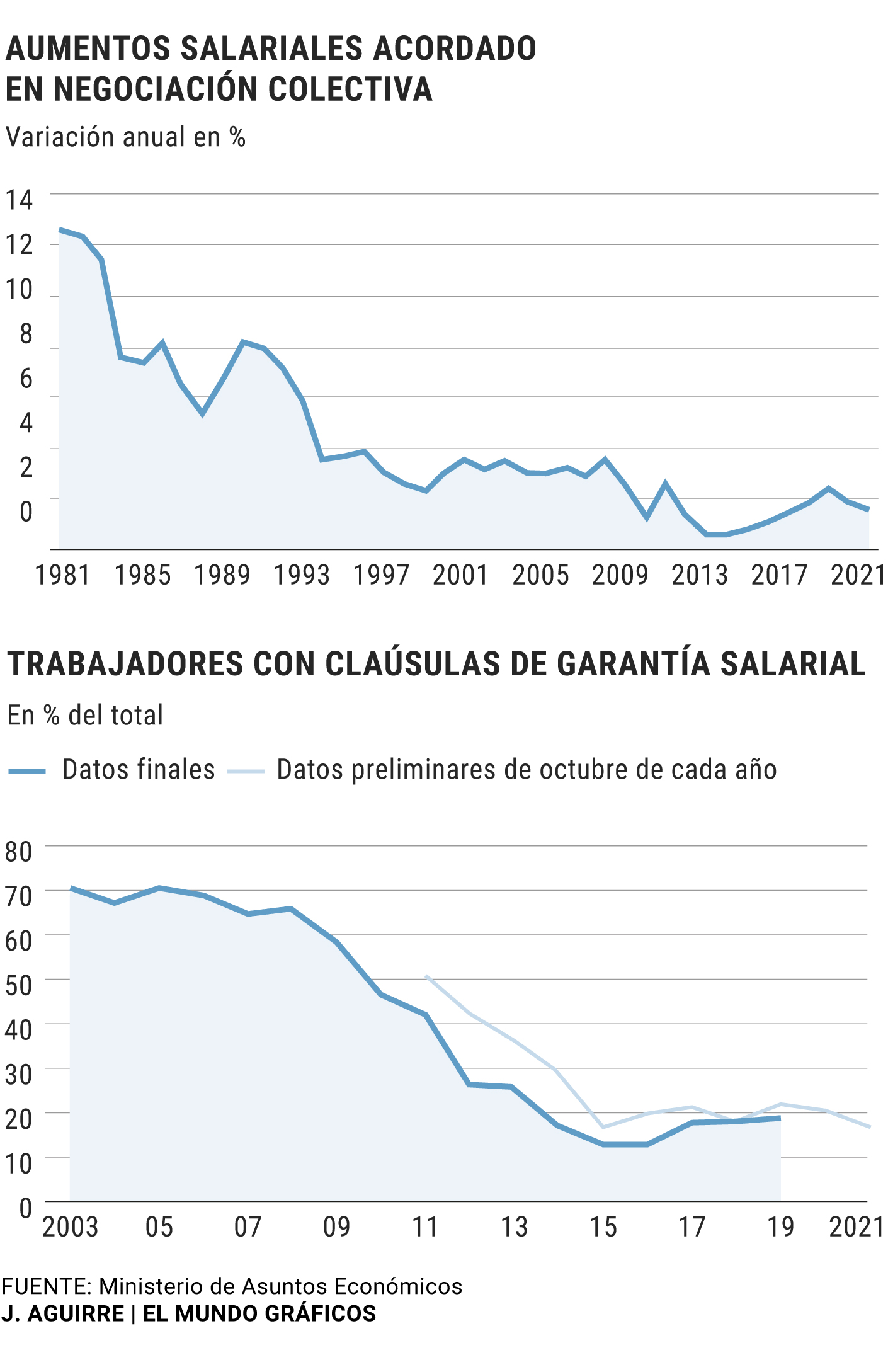The possibility that salaried workers recover some or all of the purchasing power lost against inflation in 2021 and 2022 is considered unlikely by the Ministry of Economic Affairs.
Despite the fact that, after the approval of the labor reform and the increase in the Interprofessional Minimum Wage (SMI), the unions and the Vice President and Minister of Labor,
Yolanda Díaz, have focused on the growth of wages
as part of a change in the production model, Economy considers that the increases agreed in collective agreements added to the lack of salary guarantee clauses in these agreements are proof that workers will not see their salaries updated with inflation.
"So far, there have been no changes in the wage demands of the workers: the increase agreed in the agreements remains moderate (1.5% the lowest in four years), explains the Public Treasury in a document presented to the international investors on January 10. The financing requested this year by means of letters and bonds will amount to 75,000 million euros.
In addition to the negotiations that have left the average wage increase by agreement at 1.5% in 2021, a second safety valve is added against the fear of the so-called second-round effects, according to the Treasury.
"The proportion of workers covered by agreements that include wage review clauses is currently at historically low levels," he
says.
"In this way -he assures- it is more unlikely that salaries will be updated in line with inflation".
The increases agreed in the collective agreements are much lower than the data registered by the CPI in the months of December and January.
The year
2021 closed with a rise not experienced since 1992, with an increase of 6.5%
and in January prices closed with a rebound of 6.1%.
The Economics thesis is that inflation skyrocketed in 2021 as a consequence of
the base effect
of comparing the dynamics of the CPI with that of 2020, when the economy lived for most of the year subjected to the effects of the hibernation decreed to curb the pandemic.
Energy prices, both
electricity and oil,
would complete an explanation that trusts that they will moderate throughout 2022.
The reality is that the rise in prices is a global problem that was initially interpreted by all the monetary authorities as transitory, only to later assume that it will last longer than estimated.
In this sense, the concern of economic supervisors such as the
Bank of Spain
is that generalized increases in margins will be triggered by companies and wages for workers that tie with inflation and generate the so-called second-round effects or spirals of prices.
In fact, the pressure is already there.
"Underlying inflation has stood at 2.4%: this is a consequence of
the fact that companies are increasing business margins while the average agreed salary stands at 2%
, so workers are losing purchasing power",
CCOO
has denounced
.
UGT already went further in January, announcing that its representatives in the negotiations of sectoral and company agreements will demand 5% wage increases this year, in addition to new wage guarantee clauses against the loss of purchasing power due to the rise in the CPI.
Both organizations are about to begin negotiations with employers to develop
a new Agreement for Employment and Collective Bargaining
(
AENC)
in which wage increases will play a central role.
In principle, these are bilateral negotiations in which the Government has no voice or vote, although among the social agents there are already those who detect some pressure from the Executive to start them up and reach agreements.
Implicitly, Yolanda Díaz herself, Vice President and Minister of Labor, already advocated an agreement in this regard on February 9, when she announced an agreement with the unions to raise the SMI to 1,000 euros.
Díaz justified the 3.6% increase as a political measure that aims to promote the abandonment of the anomaly of low
wages
in Spain compared to Europe and as a revulsive to raise wages in general.
The economic model must compete on productivity and not on low
wages
.
The SMI still has to be raised next year for the Government to fulfill its commitment that it represents 60% of the average salary in Spain.
The Executive has the power to decide by decree after consultation with the social agents and at its current level, the Government already manages the salary increases of millions of workers.
According to CCOO, the increase to the current 1,000 euros since last January 1 has affected
around 1,809,000
salaried people (more than 11% of the total), of which 1,518,000 work full time and 290,000 work part-time. part time.
It is this circumstance that already puts pressure on the wages of a large majority of the more than 16 million that make up the total number of workers who earn less than twice the SMI.
The negotiations will be held in any case with the employers trying to contain the demands of the unions, which reproach the former for not having complied with the last AENC, which was valid until 2020.
Conforms to The Trust Project criteria
Know more
Yolanda Diaz
CCOO
Europe
minimum salary
SMIMinimum Interprofessional Wage: Who does it affect?
When does it come into force?
Elections Castilla y León 2022Pedro Sánchez entrusts his electoral recovery to the labor reform without yet having the support of his partners
Government Casado demands the Government "break any negotiations" with Bildu after the integration of a former head of ETA in its "allied arm"
See links of interest
Last News
When does the 2021 Income start?
Work calendar 2022
Economy Podcast
How to do
Atletico Madrid - Raise
Salzburg - Bayern, live
Inter - Liverpool, live

